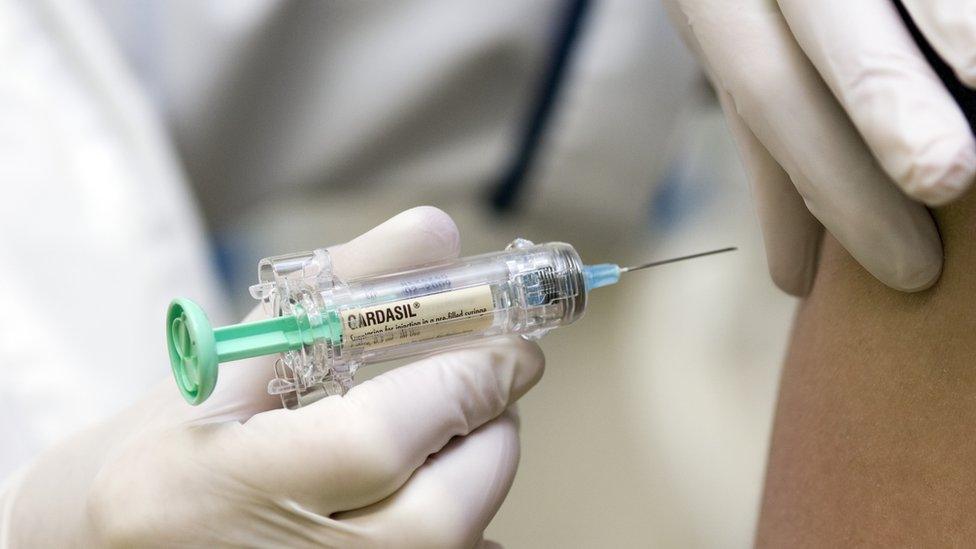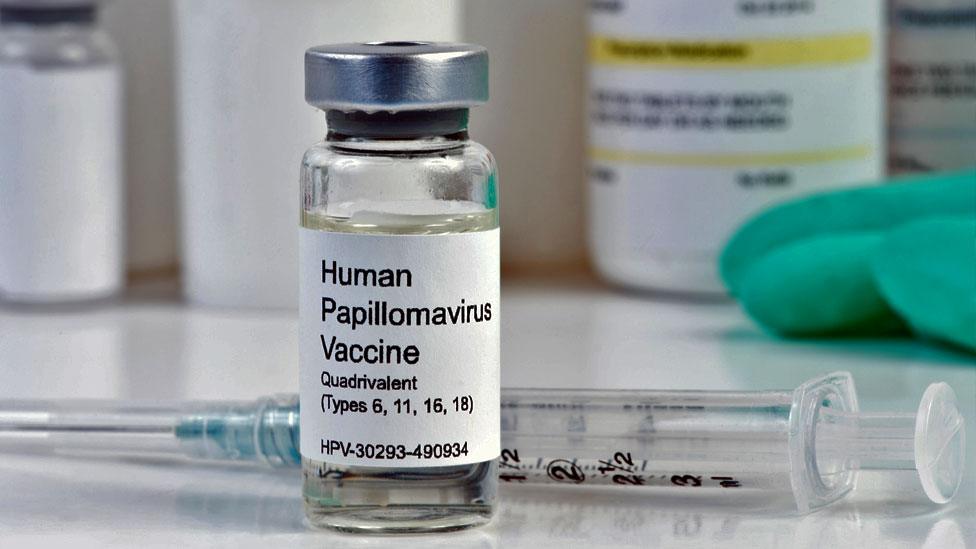HPV vaccine to be offered to boys in Northern Ireland
- Published
Cancer-preventing vaccine extended to boys
Two new health initiatives are set to be rolled out in the fight against cancer.
Boys aged 12-13 in Northern Ireland are to be offered a vaccine to protect them against Human Papilloma Virus (HPV)-related cancers.
A better bowel cancer detection test is also being introduced.
They are significant announcements for public health as they bring Northern Ireland into line with the rest of the UK.
From September the HPV vaccine will be offered to all boys in year nine at school.
It is hoped the immunisation programme will help reduce diagnoses of HPV-related cancers and save lives.
It has also been decided that the Faecal Immunochemical Test (FIT) will replace the Faecal Occult Blood (FOB) test as the primary screening test for bowel cancer in the Bowel Cancer Screening Programme (BCSP) in Northern Ireland.
This however will not begin until early 2020.
Department of Health permanent secretary Richard Pengelly said health protection clearly benefits the public.
"Both decisions have been under active consideration for some time and can now be made, following confirmation of the department's budget allocation for this year," he said.
A very high proportion of all women under 25 have already taken up the opportunity to be vaccinated against the HPV virus since the programme was first introduced in 2008 and the intention is to protect boys through similar uptake rates.

What is the Human Papilloma Virus (HPV)?

HPV is the name given to a common group of viruses; there are more than 100 types of HPV
Many women will be with infected with HPV over the course of their lifetime without any ill-effect
In the vast majority of cases, there will be no symptoms and the infection will clear on its own, but in some cases persistent infection can lead to cervical disease
Some types of HPV are high risk because they are linked to the development of some cancers
Nearly all cervical cancers (99.7%) are caused by infection from a high risk HPV
Many types of HPV affect the mouth, throat or genital area. They're easy to catch - you can get HPV from sexual contact.
Source: NHS Choices, external

This extended programme offers the opportunity to make some HPV-related diseases and cancers a thing of the past building on the success of the programme in girls.
The prevalence of the main HPV cancer-causing types 16 and 18 has already been reduced by more than 80%.
Chief Medical Officer, Dr Michael McBride, said: "We can now look forward to a future where we can be even more confident that we will reduce cervical cancer and other HPV related cancers that affect both men and women.
"This is an effective vaccine against a particularly harmful virus. I would encourage all parents to take up this offer and ensure their boys and girls are vaccinated."
The new FIT bowel screening test will be introduced from early 2020.
While cancer charities welcome the move it had been hoped that it could have been introduced sooner.
Evidence has shown there is increased patient acceptability of the FIT screening test and increased uptake of screening will mean even more lives can be saved.
Every year in Northern Ireland there are about 1,100 new cases of bowel cancer, with more than 400 deaths.
The BCSP aims to pick up bowel cancer at an early stage, when treatment can be 90% successful.

What are the symptoms of bowel cancer?
bleeding from your bottom and/or blood in your poo
a persistent and unexplained change in bowel habit
unexplained weight loss
extreme tiredness for no obvious reason
a pain or lump in your tummy

"The existing test for bowel cancer has proved hugely valuable in detecting cancer early and it is therefore essential that people invited to participate in the Northern Ireland Bowel Screening programme from 60-74 continue to complete it," Dr McBride said.
Extending the HPV vaccination programme to include adolescent boys is based on advice from the Joint Committee of Vaccination and Immunisation (JCVI), an independent panel of experts that provides advice to the four UK Health Departments.
In January 2016, the UK National Screening Committee recommended that quantitative Faecal Immunochemical Test (FIT) should be adopted by the Bowel Cancer Screening Programme (BCSP) as the primary screening test for bowel cancer.
- Published25 January 2019

- Published1 April 2019

- Published24 July 2018
